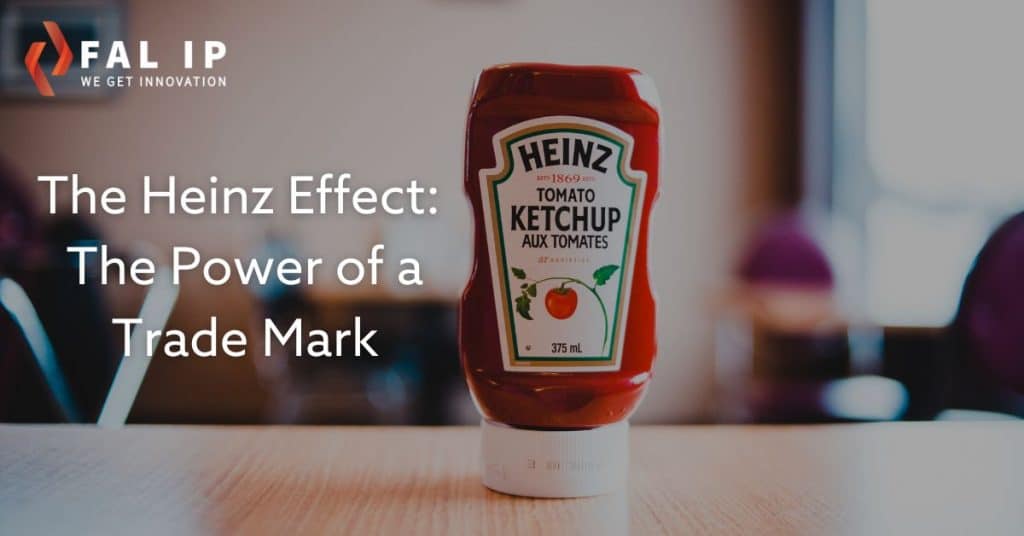Trade marks are a crucial aspect of modern business. They protect hard earned reputation and goodwill while preventing consumer confusion and deception. However, trade mark rights are not inexhaustible. Once a branded product is sold, the trade mark owner cannot rely on trade mark law to control how the product is then used, or indeed whether the product is then resold (potentially into other markets).
A recent ad campaign by Heinz highlights the value of strong brand recognition, but also raises interesting questions around the limits of trade mark law.
Does it “have to be Heinz”?
Heinz’ recent ‘It has to be Heinz’ campaign playfully highlights its success in establishing brand recognition for its ketchup. According to the below ad, Heinz anonymously tasked participants to ‘draw ketchup’ and, universally, participants ‘drew Heinz’. It is interesting to note that the drawings may not have expressly referenced Heinz (as exemplified below), but nevertheless the overall get up of the bottle drawn was unmistakably Heinz.
As part of its marketing campaign, Heinz then swapped its existing label with participant drawings. The campaign was successful, with observers suggesting it ‘proves that Heinz is ketchup’.

How far will people go for Heinz?
Heinz has since extended its ‘it has to be Heinz’ campaign with its ‘even when it’s not Heinz, it has to be Heinz’ ads. See exemple below. The ad show that many cafes and restaurants refill Heinz ketchup bottles with generic ketchup. Again playfully, Heinz has highlighted its success in establishing brand recognition and position.

The ad campaign does however raise an interesting question – can Heinz do anything to stop this behaviour? From a marketing and commercial perspective, there are reasons why Heinz may not bother. However, what if it wanted to?
Is refilling a used Heinz bottle with generic ketchup trade mark infringement?
This raises an interesting question on the limits of trade mark rights. Ostensibly, once a café owner has bought a bottle of Heinz ketchup, the owner is free to reuse and refill the bottle as they wish (from a purely trade mark perspective). That is, once a branded product is sold with the consent of the trade mark owner. Trade mark rights are exhausted (consistent with the old saying – ‘you can only sell it once’). Whether or not trade mark-related rights may assist, Australian law does provide what is likely to be a clearer way home in most circumstances.
What about misleading and deceptive conduct?
The Australian Consumer Law (ACL) prohibits conduct that is likely to mislead or deceive consumers. This includes in circumstances where a consumer believes they are receiving a certain branded product, only to receive a generic product. The ACL not only assists consumers but can be used to assist companies like Heinz where the company would suffer damage as a result of misleading and deceptive conduct. Relevant sources of damage in the circumstances may include:
- Loss of sales simply because café owners are not replacing bottles of Heinz with Heinz;
- Loss of consumer confidence in circumstances where consumers mistake an inferior product with Heinz.
In addition to the ACL, the Trade Marks Act 1995 (Cth) also prohibits the registration of trade marks that are likely to deceive or cause confusion. If a trade mark is found to be deceptive or misleading, the trade mark owner may be ordered to remove or amend the mark. The trade mark may also be cancelled or invalidated altogether.
Conclusion
While the ‘Even when it’s not Heinz, it has to be Heinz’ campaign raises some interesting trade mark issues, it would likely be counterproductive for Heinz to chase small businesses in an effort to prevent tarnishing its brand. Nevertheless, the campaign demonstrates the importance of brand recognition to consumers and brand owners alike.
Don’t hesitate to contact our team, with any queries regarding trade marks or intellectual property.
Contact us at: ip@fal-lawyers.com.au


